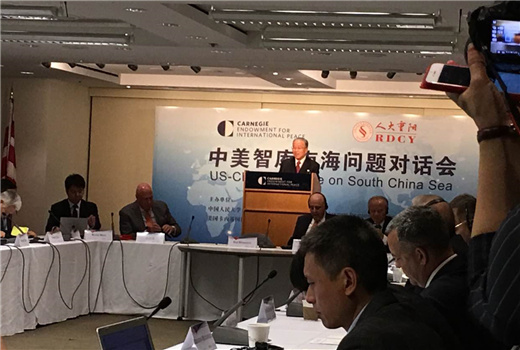 |
|
Former State councilor Dai Bingguo delivers a speech at China-US Dialogue on South China Sea between Chinese and US think tanks on?July 5?in Washington. Photo by Ji Tao/China Daily |
The frequency and destructiveness of terrorist attacks have increased. The world was still reeling from the devastating Istanbul airport attacks which killed at least 43 people on June 28, when just a few days later, Baghdad became the target of terrorists again as suicide bombings on Sunday killed some 250 people and wounded 200 more.
The Islamic State terrorist group, which is rampant in Iraq and Syria and responsible for a great number of terrorist attacks happening across the globe this year, has claimed responsibility for masterminding both attacks.
A stronger political will and greater cooperation from the international community have become the only hope for the world to eliminate the IS group, or at least to keep its threat at bay.
Last month, Iraqi officials announced they had retaken the city of Fallujah from the IS fighters after a month long military operation backed by US-led coalition airstrikes. The battle marks a turning point in the international campaign to fight the terrorist group.
In Syria, similar progress has also been made, although not as much as in Iraq, amid the Syrian government's efforts to reduce the sphere of influence of the IS group.
Yet, what we have seen these days tells the hard truth that IS terrorists may be contained in Iraq and Syria, but they are capable of wreaking havoc elsewhere and sowing the seeds of fear and panic in many places around the world.
So many innocent lives have been lost, and so high a price has been paid with the rise of the IS group. There is no reason why the world should not unite and concentrate on the anti-terrorism campaign, because terrorism and extremism have no boundaries and no country could remain immune from the scourge.
In the anti-terror campaign, the United States has played an important role, spent a lot of money and even made sacrifices. But, at the same time it is also under constant criticism for not devoting more energy and resources to fighting the terrorists in the Middle East.
If traced deeper, of course, the chaotic situation in some Middle East countries today has been the result of the US-led West's intervention policy in the region in recent years.
Some in the world arena believe US President Barack Obama, who will leave office in a little more than six months, will step up anti-terror efforts in the Middle East so as to leave it as part of his legacy as president. As the world's sole superpower, the US seeks to maintain a leading role in the Middle East, so if he is to leave the White House with a better record in the Middle East, he should coordinate more with Russia and all other forces that are fighting with the IS group now.
More importantly, the US itself should adjust its strategy. For one thing, Washington still lacks a comprehensive plan and both long-term and short-term aims for the war against the IS group.
But its constant meddling in the South China Sea issue has raised tensions in the region and offers proof for the rest of the world to recognize the US' real intention: It now has far more interest in stirring trouble in the waters of the South China Sea than helping the world make a major breakthrough in the war against terror.
The maritime disputes have nothing to do with the US, and there is no single case in which freedom of navigation has been impeded in anyway. Hence, the more the US involves itself in the South China Sea issue, the less people will believe the US remains committed to world peace and stability.
The author is deputy editor-in-chief of China Daily Asia Pacific. jasmine@chinadailyhk.com